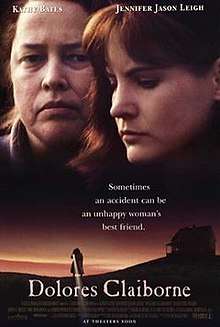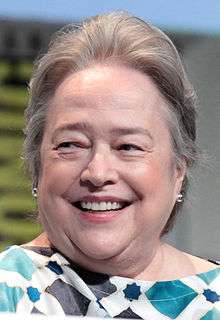Dolores Claiborne (film)
Dolores Claiborne is a 1995 American psychological thriller drama film directed by Taylor Hackford and starring Kathy Bates, Jennifer Jason Leigh, Christopher Plummer and David Strathairn. It is based on the 1992 novel of the same name by Stephen King. The plot focuses on the strained relationship between a mother and her daughter, largely told through flashbacks, after her daughter arrives to her remote hometown on a Maine island where her mother has been accused of murdering the elderly woman for whom she cared.[4]
| Dolores Claiborne | |
|---|---|
 Theatrical release poster | |
| Directed by | Taylor Hackford |
| Produced by | Charles Mulvehill Taylor Hackford |
| Screenplay by | Tony Gilroy |
| Based on | Dolores Claiborne by Stephen King |
| Starring | |
| Music by | Danny Elfman |
| Cinematography | Gabriel Beristain |
| Edited by | Mark Warner |
Production company | |
| Distributed by | Sony Pictures Releasing |
Release date |
|
Running time | 131 minutes[1] |
| Country | United States |
| Language | English |
| Budget | $13 million[2] |
| Box office | $46.4 million[3] |
The screenplay for Dolores Claiborne was adapted by Tony Gilroy, and the film was shot in Nova Scotia in 1994. Kathy Bates stated in a retrospective interview that her performance as the titular Dolores was her favorite performance she had ever given.[5] In 2013, Time magazine named the film among the top ten greatest Stephen King film adaptations.[6]
Plot
In 1995, Dolores Claiborne works as a domestic servant on Little Tall Island in Maine. Dolores has a struggle with her elderly, paralyzed employer, Vera Donovan, in her mansion. Vera falls down the staircase and Dolores ransacks the kitchen. She is caught by a mailman, who sees her standing over Vera with a rolling pin, apparently intending to kill her. Vera dies and the police begin a murder investigation.
Dolores' daughter, Selena St. George, is a successful journalist, living in New York City, who battles depression and substance abuse. Selena arrives in town to support her mother, despite her own doubts about Dolores' innocence. Dolores insists she did not kill her employer. Selena finds little sympathy for Dolores, as the entire town believes she murdered her husband, Joe St. George, almost 20 years earlier. Some of the town's inhabitants harass her by vandalizing her home, taunting her in the street, and driving by her house and screaming at her. Detective John Mackey, who was the chief detective in her husband's murder case, is determined to put Dolores away for life.
Selena also believes Dolores killed her father, and has not spoken to her mother in over a decade. In 1975, Joe was an abusive alcoholic, and one night Dolores had threatened to kill him if he ever harmed her again. Selena, then 13 years old, was unaware her mother was being abused. Dolores went to work as a housemaid for millionaire Vera Donovan to save money to pay for Selena's education. Dolores went to the bank to withdraw her money so she and Selena could flee Joe's abuse. The plan was abandoned, however, when Dolores discovered that Joe had stolen the money from Selena's savings account.
Dolores says Vera threw herself down the staircase and begged Dolores to put her out of her misery. Mackey refuses to believe her, and reveals that Vera has left her entire fortune to Dolores. Mackey informs them the will is eight years old, which nearly convinces Selena her mother is guilty. Dolores eventually tells Selena that before he died, Dolores realized Joe was sexually abusing Selena when he gave her an heirloom locket. Selena has always furiously denied any abuse, and after a fierce argument, she storms out, leaving Dolores to fend for herself.
Back in 1975, Dolores broke down and confessed Joe's abuses to Vera, who remained characteristically cold until Dolores mentioned that he was molesting Selena. Turning unusually sympathetic, Vera implied she killed her own late, unfaithful husband, Jack, and engineered it to look like an accident. Vera's confession formed a bond between the two women and convinced Dolores to take control of her situation. As a total solar eclipse approached, Dolores was pointedly given the rest of the day off by Vera. Dolores and Selena had an argument about Dolores' suspicions regarding Joe's sexual abuse. Selena fled home for the weekend to work at a hotel, where guests had flocked for the eclipse. Joe soon returned from working on a fishing boat, and Dolores offered him a bottle of Scotch to celebrate the eclipse. After Joe got drunk, Dolores revealed she knew he stole from Selena's account and molested his own daughter, then provoked him into attacking her and falling down an old well, leaving him to die as he plunges to the stone bottom.
Selena hears this entire story on a tape left for her by Dolores, who had foreseen her departure. While on the ferry, Selena suddenly uncovers a repressed memory of her father forcing her to give him a handjob. Realizing everything, Selena rushes back to Dolores as she is attending the coroner's inquest. As Mackey makes a case to be sent to a grand jury in an attempt to indict Dolores for murder, Selena arrives and tells him he has no admissible evidence, he is only doing this because of his personal vendetta against Dolores, and that despite an often stormy relationship, Vera and Dolores loved each other. Realizing that the case would likely end with either a dismissal or acquittal, Mackey reluctantly drops the charges. Dolores and Selena reconcile on the ferry wharf before Selena returns to New York.
Cast
- Kathy Bates as Dolores Claiborne
- Jennifer Jason Leigh as Selena St. George
- Ellen Muth as Young Selena
- Taffara Jessica Stella Murray as 5-year-old Selena
- Judy Parfitt as Vera Donovan
- Christopher Plummer as Detective John Mackey
- David Strathairn as Joe St. George
- Eric Bogosian as Peter
- John C. Reilly as Constable Frank Stamshaw
- Bob Gunton as Mr. Pease
- Roy Cooper as Magistrate
- Wayne Robson as Sammy Marchant
- Ruth Marshall as Secretary
- Weldon Allen as Bartender
- Tom Gallant as Searcher
- Kelly Burnett as Jack Donovan
Production
Dolores Claiborne was filmed in Lunenburg, NS, Mahone Bay, Chester, Stonehurst, Nova Scotia, Canada.[7]
Themes and interpretations
Though typically classified as a drama and psychological thriller, some critics, such as Roger Ebert, have classified Dolores Claiborne as a horror film,[8] while it has also been identified as a Gothic romance.[4]
Repression
Film theorist Kirsten Thompson identifies the film as a melodrama, "produced by the repression of specific traumas, [in this case] domestic violence and incest."[9] According to Martha McCaughey and Neal King, the film's use of flashbacks suggest a specific narrative point of view when considering the film's themes of abuse and incest between Dolores, as well as Selena and Joe: "That all the flashbacks save one belong to Dolores tells us that not only are we watching her story; it also tells us of the unavailability of the past to Selena, and of the displacement and repression forced into play by the girl's experience of incest."[10]
The flashback scene in which Selena recalls her father's forcing her to masturbate him on the ferry has been particularly noted by critics: "Here, Selena and the viewer alike come finally to see Joe's transgressions and, by implication, to understand the truth of Dolores' tale. Throughout this scene the perspective offered by the camera remains firmly focused on the reactions of the victim of the sexual crime."[11]
Feminist interpretation
Dolores Claiborne has been cited as a "self-consciously feminist" film that "combines the melodramatic impulse with the investigative structure of a noir crime thriller and a contemporary feminist consciousness."[12] The film has also been read as an example of a maternal melodrama that features an "idealized mother-figure" who sacrifices the needs of her own for others.[12] In the book Screening Genders, it is noted that one scholar considered Dolores Claiborne and Stage Door (1937) to be the only "truly feminist" films made in Hollywood, in that they "don't cop out at the end."[13]
Reception

Dolores Claiborne received mostly positive reviews from critics; it currently holds an 84% rating on Rotten Tomatoes based on 43 reviews with an average rating of 6.7. The site's consensus states: "Post-Misery Kathy Bates proves to be another wonderful conduit for Stephen King's novels in this patient, gradually terrifying thriller."[14] The film also has a rating of 62 on metacritic citing generally favorable reviews.
Janet Maslin of The New York Times called it "a vivid film that revolves around Ms. Bates's powerhouse of a performance... Only after the film has carefully laid the groundwork for a story of old wounds and violent mishaps does the anticlimactic truth become apparent."[15] Roger Ebert gave the film three out of four stars and praised the performances of Bates and Leigh, saying: "This is a horror story, all right, but not a supernatural one; all of the elements come out of such everyday horrors as alcoholism, wife beating, child abuse and the sin of pride."[8]
Entertainment Weekly, however, gave the film a negative review, awarding it a D+ rating and saying: "This solemnly ludicrous "psychological" thriller is like one of Hollywood's old-hag gothics turned into a therapeutic grouse-a-thon – it's Hush… Hush, Sweet Charlotte for the Age of Oprah."[16]
Box office
The movie debuted at number three for the week of March 26, 1995 with $5,721,920. It went on to make $24,361,867 domestically. That ranks it as the 15th highest-grossing film based on a Stephen King novel, unadjusted for inflation.[17] Adjusting for inflation, it ranks as the 17th highest.[18]
Awards
Kathy Bates and Jennifer Jason Leigh were nominated for the Best Actress and Best Supporting Actress awards at the 22nd Saturn Awards.[19] Ellen Muth also won the Tokyo International Film Festival Award for Best Supporting Actress.
See also
Notes
- Golden, Wagner & Wiater 2001, p. 218.
- "Archived copy". Archived from the original on 2017-09-23. Retrieved 2017-09-22.CS1 maint: archived copy as title (link)
- "Dolores Claiborne (1995)". www.worldwideboxoffice.com.
- McCaughey & King 2001, p. 149.
- Conan, Neal (January 26, 2011). "Kathy Bates: Storefront Lawyer On 'Harry's Law'". NPR. Retrieved October 31, 2015.
- Susman, Gary (October 18, 2013). "The Big Chills: 10 Greatest Stephen King Movies". Time. Retrieved October 31, 2015.
- Beahm 2015, p. 484.
- Ebert, Roger (March 24, 1995). "Dolores Claiborne Movie Review". RogerEbert.com. Retrieved October 30, 2015.
- Thompson 2007, p. 3.
- McCaughey & King 2001, p. 148.
- Jay 2008, p. 109.
- McCaughey & King 2001, p. 152.
- Gabbard & Luhr 2008, p. 103.
- "Dolores Claiborne (1995)". Rotten Tomatoes. Retrieved 2017-12-06.
- Maslin, Janet (March 24, 1995). "FILM REVIEW; Kathy Bates Stars as a Sardonic Murder Suspect". The New York Times. Retrieved May 14, 2018.
- Gleiberman, Owen (April 7, 1995). "Dolores Claiborne". Entertainment Weekly. Retrieved October 31, 2015.
- "Dolores Claiborne". Box Office Mojo. Retrieved 2012-08-12.
- "Stephen King". Box Office Mojo. Retrieved 2012-08-12.
- Beahm 2001, p. 484.
References
- Beahm, George (2015). The Stephen King Companion: Four Decades of Fear from the Master of Horror. St. Martin's Griffin. ISBN 978-1250054128.
- Gabbard, Krin; Luhr, William (2008). Screening Genders: The American Science Fiction Film. Rutgers University Press. ISBN 978-0813543406.
- Golden, Christopher; Wagner, Hank; Wiater, Stanley (2001). The Stephen King Universe: The Guide to the Worlds of the King of Horror. Renaissance Books.
- McCaughey, Martha; King, Neal, eds. (2001). "Sometimes Being a Bitch is All a Woman Has to Hold Onto". Reel Knockouts: Violent Women in Film. University of Texas Press. ISBN 978-0292752511.
- Thompson, Kirsten Moana (2007). Apocalyptic Dread: American Film at the Turn of the Millennium. Horizons of Cinema. SUNY Press. ISBN 978-0791470442.
Further reading
- Weird Lullabies: Mothers and Daughters in Contemporary Film. Peter Lang AG. 2008. ISBN 978-3039118397.